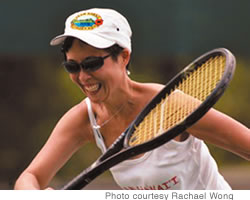The Life-changing Gift Of A Kidney

Friday - March 03, 2010
| Share
 Del.icio.us
Del.icio.us
|
In an effort to raise awareness of kidney disease and the need for organ donors, the National Kidney Foundation of Hawaii (NKFH) is hosting World Kidney Day March 11 at the State Capitol from 11 a.m. to 4 p.m.
The event includes food, entertainment and free kidney screenings.
“In Hawaii there are close to 400 people on the waiting list (for an organ), and out of that 90 percent of them are in need of a kidney,” notes Glen Hayashida, CEO of NKFH. “And I believe nationwide there are more than 100,000 on the waiting list. So, there’s just a need that’s ever growing and what we’re trying to do is address the problem two ways: through prevention so we can slow down the number of people who end up on the list and the number of people on dialysis, and at the same time raise awareness about the need for organ donors.”
The earlier kidney disease is detected, the better the chance of slowing its progression. According to Hayashida, however, there really are no signs or symptoms of kidney disease in the early stages. When it becomes kidney failure you really can’t reverse the course, but the symptoms start to appear, such as frequent urination, lower back pain, and swelling of the fingers and toes.
Fortunately for us in Hawaii, since 2005 patients who take a standard blood test automatically get a GFR (glomerular filtration rate) test as well, which is a measure of your level of kidney function and determines your stage of kidney disease.
But for those who don’t see a doctor regularly, the NKFH is encouraging the public to attend World Kidney Day, where they will be conducting the first level of screening by offering a free blood pressure and take-home urine test.
“The urine test will show if you’re spilling protein,” explains Hayashida, “because if your kidney is healthy then it should not be spilling protein.”
Rachael Wong, a kidney transplant recipient, is living proof that transplantation saves lives.
A four-year varsity tennis player when she was at Punahou, Wong was diagnosed with lupus at 18 while attending Princeton University.
It eventually became a chronic illness that left her unable to work and inactive.
Twelve years later, in 2000, she was told she needed a kidney transplant and immediately started dialysis. Her name was added to the national waiting list and, in April 2002, she received a kidney transplant from a local deceased donor.
“For those of us whoexperience kidney failure, we’re really lucky for dialysis because it allows us to extend our lives,” says Wong, 38. “And then it was through the generosity of a local family who at their darkest moment was able to give the gift of life. I never met the family but I write letters on the anniversary of the transplant every year and during the holidays and express my gratitude.
“When you’re on dialysis you’re surviving, but with the kidney transplant I’m healthy again. I’m thriving. I’m working. I’m able to contribute back to society and our community, and I wasn’t able to do that on dialysis.”
In July, Wong will defend her gold medal in tennis singles and women’s doubles at the U.S. Transplant Games in Wisconsin. The U.S. Transplant Games are held every two years and is an Olympic-style competition with participants being transplant recipients, living donors, donor families and team supporters.
“After 12 years of illness, I forgot what it was like to be healthy,” says Wong. “Every year I get stronger and healthier. Now I’m fully active. I play tennis. I do yoga. I work (as the executive director of the Hawaii Consortium for Integrative Healthcare). There are no limitations. It’s a second chance of life that I’m forever grateful for.”
According to Hayashida, the purpose of the transplant team is to raise awareness of the need for organ donors. It also acknowledges the donors and helps to highlight the fact that people cannot only live a normal life after a transplant (whether you’re the recipient or donor) but also engage in athletic competition.
“We also want people to know that transplantation works,” he says. “It’s a very viable way of sustaining a normal life because once your kidney fails there’s really no cure for kidney failure.”
For more information on becoming a donor, visit http://www.kidneyhi.org or call 593-1515
E-mail this story | Print this page | Comments (0) | Archive | RSS Comments (0) |
Most Recent Comment(s):













